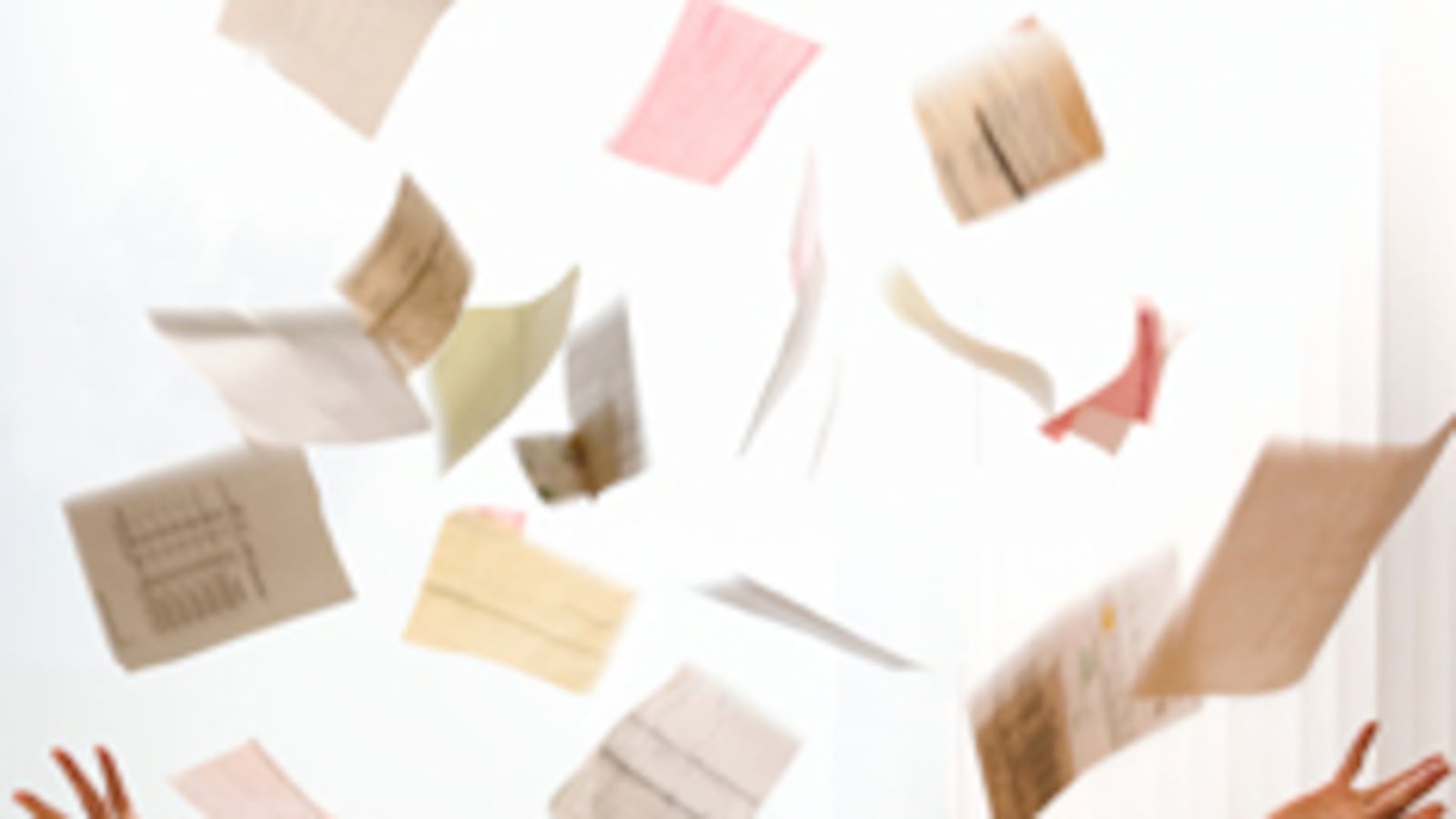
When Daily Beast product team member Nicholas Ciarelli gave up books, magazines, bank statements, office memos, and even mail, he learned the freedom of living digitally. And the unexpected price.
Eighteen months ago I decided to opt out of the oppressive world of books, magazines, newspapers, business cards, store receipts, and old toaster instruction manuals, and have been almost entirely paperless ever since.
In 2010, adopting a paperless lifestyle is not an especially rare feat. It’s not even that difficult. After all, most people have already accomplished this in one aspect or another without even trying hard, whether they receive their credit card bills electronically or find their news online. If anything, my paperless life is distinctive only in its breadth: My once sprawling bookshelves have been wholly replaced by an overstuffed Kindle, and I now only consume magazines from the Kindle Store (except, ironically, Wired, which is not available in this format). I also use an indispensable tool called Instapaper to maintain a queue of other unread articles and Web pages that I read on my Kindle or iPhone.
Visa can predict with a fair amount of precision whether one of its cardholders is going to get a divorce.
Any paper documents that enter my home—receipts, invoices, letters—are quickly scanned and shredded. (My weapon of choice is a sheet-fed document scanner called the Fujitsu ScanSnap, which can scan both sides of a stack of paper at about 20 pages per minute.) Some paperless mavens then store these scanned documents on sites like Evernote, so that they can be retrieved anywhere. And services like Earth Class Mail will—for a fee—receive and scan your mail so that you can view (and discard) it from the comfort of your Web browser.
In the next few years, the paperless lifestyle will only get easier and more prevalent. It is estimated that more than six million e-book readers will be sold in the U.S. this year. And worldwide shipments of touchscreen tablets will skyrocket from a niche market of two million to eight million annually, according to forecasts from Morgan Stanley. (Apple has scheduled a media event for Wednesday morning, inviting the press to "Come see our latest creation.")
Fifteen years ago, Nicholas Negroponte predicted in Wired that companies would shift their business from distributing atoms (physical products) to distributing bits (digital products). Witness that shift at Amazon.com, which sells more atoms than any other company on the Internet. On Christmas Day 2009, the retailer sold more e-books than printed books. (Granted, Amazon wasn't exactly shipping physical books on December 25, but it's still a milestone for digital content.)
Over the past 18 months I have come to believe that the most significant advantage of the paperless lifestyle is that of control: a greatly heightened ability to harness media and information more purposefully. When you're paperless, you can store and retrieve your media at will, conjuring a book when you're waiting in line at the grocery store, or finding a receipt with the ease of a few clicks instead of dumping out a wallet.
There's another important aspect of control: With a paperless life, you have a greater ability to measure how you consume media, such as in these charts, which depict the pace at which different readers enjoyed a short story. Most people do not imagine ever wanting to chronicle something like this—after all, none of this measurement is possible with printed material. But just as services like Mint.com have enabled us to measure and derive new insights from our personal finances, I predict that we will soon demand the same data from the books we read.
This control cuts both ways of course: If you can control your media more easily, then others can as well. Companies can restrict how you store and retrieve your e-books in entirely new and perhaps unsavory ways, such as prohibiting you from lending an e-book to a friend's device, or by reclaiming a book that you've already purchased, as occurred last summer when Amazon remotely deleted two books by George Orwell from users' Kindles. (The company has since apologized.)
By the same token, if you can more easily measure your media consumption, then others can as well. Consider the possibilities: Novelists could identify the point at which people are most likely to abandon their books, and could then release modified versions with those parts re-written. Authors could even release different versions of their books to different customers and conduct experiments to see which editions are the most effective, testing out different plotlines, characters, or endings.
It's also easy to conceive of a future where this type of measurement is used for profit. Data on how we consume media—what we read, how we read it, and when we read it—could be exploited by content owners to create detailed profiles of consumers; those profiles could then be used to market products to them with alarmingly high degrees of accuracy.
This possibility should not be surprising given the advances in data mining that we have seen in recent years—according to Yale Law School professor Ian Ayres, for instance, Visa can predict with a fair amount of precision whether one of its cardholders is going to get a divorce.
And perhaps that’s one of the biggest ironies of living a paperless life—we leave more of a paper trail, electronically speaking. Activities that were once relatively anonymous—say, buying a magazine at a newsstand with cash—now leave digital footprints. As we transition to paperless living it remains to be seen whether consumers will seek to cover their tracks.
Nicholas Ciarelli is the former publisher of Think Secret, an Apple news Web site. He currently works on the product team at The Daily Beast.






